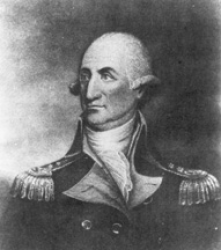
 |
|
|
||
|
John Peter Gabriel Muhlenberg |
||||
|
Engagements: • Revolutionary War (1775 - 1783) |
||||
| Biography: | ||||
|
John Peter Gabriel Muhlenberg John Peter Gabriel Muhlenberg was born on 1 October 1746 in Trappe, PA, the son of Pennsylvania Dutch parents, Henry and Anna Muhlenberg. He was sent, together with his brothers, Frederick Augustus and Gotthilf Henry Ernst to Halle, Germany in 1763, where they were educated in Latin at the Francke Foundations. He left school in 1767 to start as a sales assistant in Lübeck and returned the same year to Pennsylvania. There he received a classical education from the Academy of Philadelphia, which is today the University of Pennsylvania. Muhlenberg also served briefly in the German Dragoons, earning the nickname "Teufel Piet" (Devil Pete) before returning to Philadelphia. He was ordained in 1768 and headed a Lutheran congregation in Bedminster, NJ, before moving to Woodstock, VA. In 1770, he married Anna Barbara "Hannah" Meyer, the daughter of a successful potter. Together they had six children. Muhlenberg visited England in 1772 and was ordained into the priesthood of the Anglican Church, although he served a Lutheran congregation. Since the Anglican Church was the State Church of Virginia, he was required to be ordained in an Anglican church in order to serve a congregation in Virginia. Besides his new congregation, he led the Committee of Safety and Correspondence for Dunmore County, VA. He was elected to the House of Burgesses in 1774, and was a delegate to the First Virginia Convention. Military Career Toward the end of 1775, Muhlenberg was authorized to raise and command, as its Colonel, the 8th Virginia Regiment of the Continental Army. After George Washington personally asked him to accept this task, he agreed. However, his brother Fredrick Augustus Mulenberg, who was also a minister, did not approve of him going into the Army until the British burned down his own church in front of him. Then he too joined the military. According to a biography written by his great-nephew in the mid-19th century, on 21 January 1776 in the Lutheran church in Woodstock, Reverend Muhlenberg took his sermon text from the third chapter of Ecclesiastes, which starts with "To everything there is a season..."; after reading the eighth verse, "a time of war, and a time of peace," he declared, "And this is the time of war," removing his clerical robe to reveal his Colonel's uniform. Outside the church door the drums began to roll as men turned to kiss their wives and then walked down the aisle to enlist, and within half an hour, 162 men were enrolled. The next day he led out 300 men from the county to form the nucleus of the Eighth Virginia Regiment. Muhlenberg's unit was first posted to the South, to defend the coast of South Carolina and Georgia. In early 1777, the Eighth was sent north to join Washington's main Army. Muhlenberg was made a Brigadier General of the Virginia Line and commanded that Brigade in Nathanael Greene's Division at Valley Forge. Muhlenberg saw service in the Battles of Brandywine, Germantown, and Monmouth. After Monmouth, most of the Virginia Line was sent to the far south, while General Muhlenberg was assigned to head up the defense of Virginia using mainly militia units. At the Battle of Yorktown, he commanded the First Brigade in Lafayette's Light Division. His brigade was made up of the Corps of Light Infantry, consisting of the light infantry companies of the line regiments of Massachusetts (ten companies), Connecticut (five companies), New Hampshire (five companies), and Rhode Island and New Jersey (one each). They held the right flank and manned the two trenches built to move American cannons closer to Cornwallis' defenses. The battalion commanded by French Lt-Col Jean-Joseph Sourbader, Chevalier de Gimat, led the night bayonet attack that stormed Redoubt No. 10 on 14 October 1781. At the end of the war (1783), he was brevetted to Major General and settled in Montgomery County, PA. Muhlenberg was also an original member of the Pennsylvania Society of the Society of the Cincinnati. Political Career After the war, Muhlenberg was elected to the Supreme Executive Council of the Commonwealth of Pennsylvania in 1784. He was elected Vice-President of the Council, a position comparable to that of Lieutenant Governor, on 31 October 1787. His term as Vice-President ended on a mysterious note. On 14 October 1788, the minutes of the Executive Council report that Muhlenberg had left Philadelphia without tendering his resignation-why his resignation was needed or expected is not noted-so a messenger was sent after him. That night, after the messenger returned with the resignation, the Council met at President Benjamin Franklin's home to choose Muhlenberg's successor, electing David Redick to the position. Muhlenberg was elected to the 1st Congress (1789-91) as one of the at-large representatives from Pennsylvania. His brother, Frederick, was the Speaker of the House for that same Congress. He was the first founder of the Democratic-Republican Societies in 1793. Muhlenberg served in Congress as a Republican during the 3rd Congress 1793-95 and 5th Congress 1799-1801 for the 1st district. Muhlenberg was elected by the legislature to the U.S. Senate on a second ballot in February 1801 over George Logan, but resigned on 30 June of that same year. President Thomas Jefferson appointed him the Supervisor of Revenue for Pennsylvania in 1801 and Customs Collector for Philadelphia in 1802. He served in the latter post until his death. Honors Muhlenberg is the namesake of Muhlenberg County, KY. A memorial to Peter Muhlenberg is located in Washington, DC, on Connecticut Avenue. Death and Burial Major General John Peter Gabriel Muhlenberg died on 1 October 1807 in Montgomery County, PA. He is buried at the Augustus Lutheran Church Cemetery in Trappe, PA. |
||||
| Honoree ID: 2884 | Created by: MHOH | |||
Ribbons
Medals
Badges
Honoree Photos
 |  |  |
 |  |
 |


